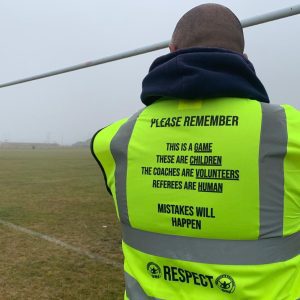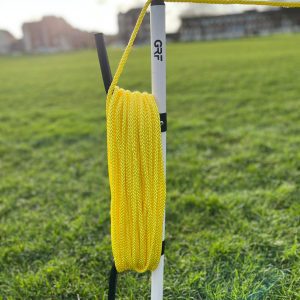The children are more important than the sport in which they are engaged. The game is not the thing, the child is…..
Being a kids football coach
So once again, I find myself in a contemplative mood on a Monday morning. Questioning why I coach, what my motives are and whether it is ‘worth it’?
My kids football team played again yesterday. We were beaten 7-0, which in itself is no issue for me. It is the manner in which the other team played that upsets me. Win at all costs. Physically bullying my team. Kicking and constant fouling, which I believe, has to be ‘coached’ because at this age, the kids don’t play like that naturally.
All of which went unpunished by the ‘home’ referee (Qualified ref by the way), who looked like he couldn’t care less. The welfare of the children was not on his radar at all. All of this in a format called ‘Festival Football’ which is supposed to be about fun, learning, development and teamwork.
Here are some of the quotes from the FA’s mini soccer and U9/10’s football guides:
The children are more important than the activities in which they are engaged. The game is not the thing, the child is
If children are to enjoy and take part in football they need to:
• Feel success
• Take an active part in the game
• Learn to play as a team
• Understand the Laws
• Develop soccer skills
• Be able to take part whatever their ability
• Develop fitness
The Referee will have an important role to play in Mini-Soccer. Carrying out their duties without favour they should look to create a playing environment, which is fun for all taking part.
The Referee should encourage fair play, fun, respect for others, development of skills and team work, understanding of the Laws of the Game. The Laws of the Game should be a guide for the Referee in Mini-Soccer, with the spirit of the laws being more important than the letter of the law.
Appreciation of the needs of the child is essential
Coaches/Managers must always promote the appropriate Code of Conduct and positive aspects of the sport (e.g. fair play) to players, parents and spectators alike. Never condone violations of the Laws of the Game, behaviour contrary to the spirit of the Laws of the Game or relevant rules and regulations or the use of the prohibited substances or techniques
Coaches/Managers must place the well being and safety of each player above all other considerations, including the development of performance
Mini-Soccer aims to set realistic expectations. It focuses on the development of children rather than the result of the match.
Now I am not perfect. Not by any means. I do however, take my role as a coach seriously. I first started coaching my eldest son’s team when he was 6. He turns 15 this year. When he was 12, I decided to take a step back and let him experience a
different coaching style. I was only out of the game for 6 months, before I was asked to get involved with my younger sons team. (He was 7). Because I genuinely love coaching, I said yes.
The festival football format was just getting under way and I believe in its ethos and felt that we could really help these kids develop in an environment that didn’t place emphasis on winning. There are no league tables in festival football.
Scores cannot be published. It is played in an environment that doesn’t put pressure on the children. Or at least that is the theory. The reality is somewhat different:
I have been contacted by other coaches and asked to provide my scores to them every weekend, so they can keep a ‘league table’
I have witnessed coaches encouraging players to ‘hurt’ or physically bully my players, just to ensure they win
I have witnessed ‘home’ referees, who are so biased to the home team, in terms of decisions, protection, encouragement and understanding of the game, that it has caused members of my team to physically cry with frustration
I have witnessed coaches leaving their perceived ‘weakest’ players on the bench, giving them little or in some cases, no game time.
I have been verbally abused by up to 10 parents at one time, for asking the referee to protect my children
I could go on and on but I won’t. I don’t want you to think that I don’t love the game. Because I do. I genuinely love coaching these kids and seeing the smiles on their faces when they do something well. Seeing them develop from kids that just know they enjoy kicking a ball around, to kids that enjoy kicking the ball around and can do it with a little bit of skill. Watching them form friendships in the group. The positive influence we can have on these children is immense. What drags me down is the negatives that appear to be lurking.
If the FA really want to make a change, then they need to get serious. They need to create a framework for coaches of all ages, that spells out what is acceptable and what isn’t. They need to back that up by giving the power to the local leagues, to exclude the teams that don’t want to adhere to this. And they must use it.
If the ‘coaches’ of these teams are lost to the game, then so what? It will be a bigger tragedy if we lose kids from the game who don’t want to play any more, because they are sick of being kicked, pushed and generally bullied by teams who only care about winning.
Its worth noting that I am not a ‘bleeding heart’ liberal who doesn’t want any sort of competitiveness. I encourage my boys to learn that there are winners and losers in every aspect.
If we lose, we do it gracefully. If we win, its because we have played better football than the other team and we do that gracefully as well
I will leave you with one of the quotes from the beginning, which to me, sums it up perfectly.
“The children are more important than the activities in which they are engaged. The game is not the thing, the child is.”
Yours in Sport
A Grassroots coach.








0 Comments